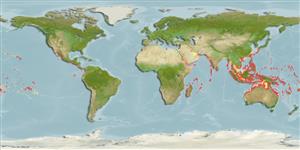Common names from other countries
Environment: milieu / climate zone / depth range / distribution range
Ecologia
marino associati a barriera corallina; distribuzione batimetrica 1 - 48 m (Ref. 58302), usually ? - 10 m (Ref. 30404). Tropical; 32°N - 33°S, 27°E - 76°W
Indo-Pacific: Red Sea and East Africa (Ref. 33390) and Persian Gulf (Ref. 68964) to the Society Islands, north to southern Japan and the Hawaiian Islands, south to Lord Howe Island; throughout Micronesia. Eastern Central Pacific: southern Baja California, Mexico and from Costa Rica to northern Colombia (Ref. 9324). Also found in Southeast Atlantic.
Size / Peso / Age
Maturity: Lm ? range ? - ? cm
Max length : 100.0 cm TL maschio/sesso non determinato; (Ref. 48635); common length : 50.0 cm TL maschio/sesso non determinato; (Ref. 3258)
Spine dorsali (totale): 0; Raggi dorsali molli (totale): 0; Spine anali 0; Raggi anali molli: 0; Vertebre: 119 - 126. Body white with 2 rows of large dendritic black blotches; black spots between blotches become irregularly linear with age. Yellow eyes (Ref. 48635).
Found between rocks and corals of intertidal reef flats, also in shallow lagoon and seaward reefs to depths of at least 10 m (Ref. 9710, 58302). Benthic (Ref. 58302). Nocturnal (Ref. 68964). Feed mainly on crustaceans. Protogynous hermaphroditism unconfirmed for this species (Ref. 84746). Safely kept with small aquarium fishes (Ref. 9710). Solitary, seen usually in the open or with only head exposed (Ref 90102).
Life cycle and mating behavior
Maturità | Riproduzione | Deposizione | Uova | Fecundity | Larve
Protogyny unconfirmed (Ref. 84746).
Chen, H.-M., K.-T. Shao and C.T. Chen, 1994. A review of the muraenid eels (Family Muraenidae) from Taiwan with descriptions of twelve new records. Zool. Stud. 33(1):44-64. (Ref. 6934)
IUCN Red List Status (Ref. 130435)
CITES (Ref. 128078)
Not Evaluated
Threat to humans
Harmless
Human uses
Pesca: scarso interesse commerciale; Acquario: Commerciale
Informazioni ulteriori
BibliografiaAcquacolturaProfilo di acquacolturaVarietàGeneticaElectrophoresesEreditarietàMalattieElaborazioneMass conversion
Strumenti
Special reports
Download XML
Fonti Internet
Estimates based on models
Preferred temperature (Ref.
115969): 24.9 - 29.3, mean 28.4 (based on 3674 cells).
Phylogenetic diversity index (Ref.
82804): PD
50 = 0.5005 [Uniqueness, from 0.5 = low to 2.0 = high].
Bayesian length-weight: a=0.00034 (0.00022 - 0.00052), b=3.31 (3.19 - 3.43), in cm Total Length, based on LWR estimates for this species & (Sub)family-body (Ref.
93245).
Trophic level (Ref.
69278): 4.2 ±0.71 se; based on food items.
Resilienza (Ref.
120179): Basso, tempo minimo di raddoppiamento della popolazione 4.5 - 14 anni (Preliminary K or Fecundity.).
Fishing Vulnerability (Ref.
59153): High vulnerability (60 of 100).
